All posts
Older people and gambling
Gambling is engrained in Australian culture. However, when gambling becomes harmful instead of positive, it can have severe consequences. Older Australians have the highest rates of many types of gambling and are particularly at risk of gambling harm. We’ll go through the signs of gambling harm in older people and how you can help an […]


Gambling is engrained in Australian culture.
However, when gambling becomes harmful instead of positive, it can have severe consequences. Older Australians have the highest rates of many types of gambling and are particularly at risk of gambling harm.
We’ll go through the signs of gambling harm in older people and how you can help an older loved one you may be worried about.
Signs of gambling harm in seniors
Gambling becomes harmful when it starts to have negative consequences on the person’s life and wellbeing.
Signs that gambling is becoming harmful may include:
- Sudden decrease in wealth
- Lying about their gambling
- Stress, anxiety, panic attacks
- No other hobbies besides gambling
- Using pension funds or savings to gamble
- Increasing the amounts they are gambling
- Gambling in the hopes of winning back losses
- Not being able to set limits on gambling activities
- Bragging about gambling wins or minimising losses
- Irritability when asked about gambling or when not gambling.
Worrying numbers
Research shows that older Australians are more at risk of gambling harm than other age group.
Over 23% of older Australians play the pokies, compared to only 16% of the general adult population.
Over 63% of older Australians play the lottery.
Why older people gamble
Studies show that older Australians gamble due to loneliness, the need for social interaction, and ease of access.
Social isolation
Social isolation is a major cause of loneliness amongst the elderly. A study by Relationships Australia reveals that over 27% of retired Australians feel lonely.
Older people are at risk of social isolation due to factors such as mobility issues, friends or spouses passing away, and retirement.
Ease of access
Gaming venues in Australia tend to offer promotions targeting older people. Incentives may include cheap meals for seniors, free entertainment geared toward an older audience, and free shuttle buses to and from venues.
These promotions make gambling easy for older people to access, but they can also exploit older people’s vulnerabilities.
Advice for loved ones
Learning about safer gambling can protect your older loved one’s financial wellbeing.
We offer a guide to talking to an older person you’re worried about here.
Below are some ways you can help protect your older loved one from the risks of gambling harm:
Suggest less risky hobbies
Suggest alternate hobbies that are accessible and safe for someone of their age group and ability level. Ideas may include joining a local social club, gardening, or puzzles.
Help them to access other activities
While gambling venues are often accessible for the older population, other activities may be harder to attend due to transportation or mobility issues.
You can help by offering to drive them to safer activities, such as free senior social groups.
Here is a list of ten fun, safe activities for seniors.
Be honest about the odds of winning
Studies show that older Australians have limited understanding of Electronic Gaming Machines (EGMs), as well as misperceptions about potential EGM harm.
Gently communicate with your loved one about gambling’s risk of losing versus the odds of winning.
RAQ offers a Senior Financial Protection Service (SFPS), a free community education program to help older people make informed decisions and to stay safe from financial elder abuse.
You can learn more about the SFPS here, or by calling 1300 063 232.
Want to receive updates on our Senior Relationship Services blog posts?
Back to all posts